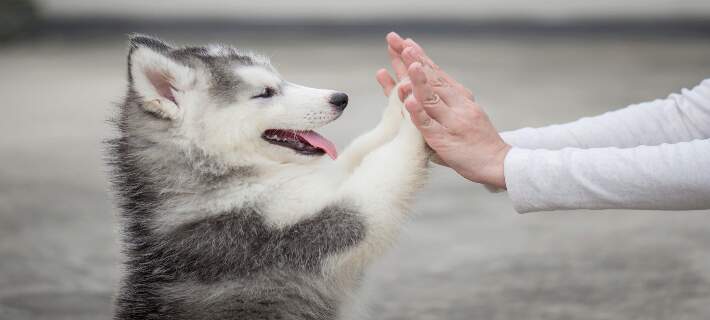
Puppies are undeniably among the most beloved and charming creatures, capable of bringing boundless joy into any home. These young dogs represent a time of excitement, growth, and curiosity, where they are not only learning about the world around them but also developing bonds with their human families. While their playful manoeuvres, wagging tails, and innocent eyes can instantly burn hearts and minds, raising a puppy involves significant commitment and responsibility. Beyond the cute cuddles and adorable behavior, it requires a frequent approach puppy training, health care, and socialization to ensure they grow into well-adjusted adult dogs. Understanding the different needs of puppies—from proper nutrition to veterinary care and training techniques—is important to raising a happy and healthy pet.
The first months of a puppy’s life are critical for their overall development. The time has come when they are most impressionable, and their experiences can significantly shape their future behavior. Socialization plays an essential role, where experience of various environments, people, and other animals can help prevent behaviour issues such as anxiety or aggression later in life. It’s important for puppy owners to gradually introduce their young dogs to different experiences in a positive and controlled manner, permitting them to feel safe and confident. Alongside socialization, basic follow training should start as early as possible, teaching essential statements like “sit, inches “stay, inches and “come. inches These foundational skills not only make everyday living easier but also contribute to a strong bond between the puppy and its owner.
Proper nutrition is another vital part of raising a healthy puppy. Puppies require a balanced diet that provides the right amounts of protein, fat, vitamins, and mineral to support their rapid growth and development. Unlike adult dogs, puppies have higher energy needs, and feeding them high-quality puppy food designed for their age and breed size ensures they be given the necessary nutrients. Owners should avoid overfeeding, as this can lead to obesity, which is especially problematic for certain breeds prone to joint issues. Regular veterinary check-ups during the puppy stage crucial to monitor their growth, administer vaccinations, and discuss any concerns related to diet or health.
House training, or teaching a puppy where and when to ease themselves, is a primary concern for many new dog owners. Patience and consistency are type in this process, as puppies do not have fully developed bladder control and will need frequent breaks. Establishing a routine that includes taking the puppy outside after meals, naps, and playtime can help reinforce proper bathroom behavior. Positive support, such as treats and praise, can also encourage them to develop good habits. Dog house training is a valuable tool during house training, providing a safe space for the puppy while preventing accidents when they cannot be checked.
Puppy-proofing the home is another step that ensures the safety of the young dog. Much like with a human baby, puppies are naturally curious and will chew, scratch, and explore their surroundings, often getting into places they shouldn’t. Removing potential hazards like electrical cables, toxic plants, and small objects that could be swallowed reduces the risk of accidents. Providing appropriate chew toys can satisfy their urge to chew while protecting furniture and other household items from damage. Supervising the puppy and redirecting inappropriate behaviors can also help establish border.
Exercise is essential for puppies, but it must be appropriate for their age and physical development. Over-exercising young puppies, especially those from large breeds, can harm their developing our bones and joints. Short, frequent play sessions with interactive toys, gentle walks, and basic training exercises are ideal for keeping a puppy physically and emotionally stimulated. Puppy socialization classes can also be a great way for them to interact with other dogs in a controlled setting, improving their social skills while burning off energy.
Teething is another challenge puppy owners often face, as young dogs will chew on anything they can find to alleviate their gums. Providing safe and durable chew toys can help alleviate discomfort preventing them from damaging household items. Some puppies may also experience intestinal issues or a mild feeling sick during teething, which is generally normal, but if symptoms remain, consulting a animal medical practitioner is advisable. Monitoring the puppy’s teeth’s health during this stage is important, as baby teeth should naturally drop out to make means for adult teeth.
Training a puppy to walk on a leash is also a significant milestone. Teaching them to be comfortable with wearing a back of the shirt and gradually introducing the leash can prevent them from developing negative associations. Using positive support, such as treats and mental praise, encourages the puppy to walk without pulling or resisting. A properly trained puppy on a leash makes outdoor activities safer and more enjoyable for both the dog and the owner.
Building a lifelong bond with a puppy involves more than just training and care; it provides spending quality time together. Daily playtime, cuddling, and regular interaction foster a strong relationship, making the puppy feel secure and loved. Each puppy has a unique personality, and understanding their preferences and quirks will enhance the bond, making training more effective and creating a deeper connection.
As puppies grow into adult dogs, the experiences and training they receive in their early months lay the walls for their behavior throughout their lives. Raising a puppy is a journey that brings immense rewards and a deep sense of fulfillment. With proper care, training, and love, a puppy can grow into a loyal and well-behaved companion, enriching the lives of their human families for many years to come.